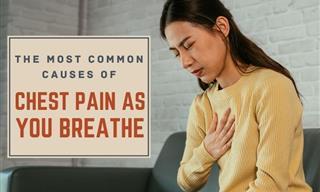1. A feeling like you have something heavy on your chest

Some patients describe the chest pain they experience as a tightness, dull pain, or heaviness, almost as if they had a weight sitting on their chest. Like sharp chest pain, any of these symptoms can point to poor blood flow to the heart, which could result in a heart attack or a less threatening condition called angina. In the case of a heart attack, this chest discomfort can often be accompanied by other symptoms, such as:
- Lightheadedness
- The inability to exercise
- Heart palpitations
- Pain radiating to the jaw or the left arm
- Shortness of breath.
Learn more about the signs of a heart attack in our previous article titled Surprising Signs of a Damaged Heart.
2. Unexpected shallow breathing, chest tightness, and heart palpitations
Other health conditions can sometimes mimic the symptoms of a heart attack. For example, a panic attack can often be sudden and extremely unpleasant, so people who experience it for the first time may mistake it for a heart attack. Like a heart attack, a panic attack causes chest pain, tightness in the chest, and heart palpitations.
However, unlike a heart attack, the cause of these symptoms is stress and shallow breathing. A panic attack typically resolves within 20-30 minutes. For those who experience anxiety-related chest tightness or panic attacks, therapy sessions and relaxation techniques are helpful tools. For a more in-depth discussion of panic attacks, read our article How to Help Someone Having a Panic Attack.
3. Intense pain when you inhale

If the pain and tightness in your chest appear to worsen when you take a deep breath, this can point to a lung issue. This type of pain and discomfort is present in pneumonia, before an asthma attack, a blood clot in the lungs, or in patients with pleurisy, an inflection in the lining of the lungs.
This pain can appear on one of both sides of the chest, and it can spread to your shoulder. Many of these lung issues come with a fever, but not all do, and you’ll definitely need to visit your doctor and take medications to recover.
4. A burning sensation in the chest
A burning and tight feeling in the chest could point to a digestive issue, such as acid reflux, stomach ulcers, or even a ruptured esophagus, which is the tube that connects your stomach and your throat. Needless to say, any of these conditions require immediate medical attention and they will not go away on their own.
To ease your symptoms, it’s a good idea to avoid spicy and large meals in the second half of the day and it helps to sleep with your head elevated.
Related Article: Gastric Obstruction – Causes, Symptoms & Treatments
5. Sharp pain when you lay down on your side
If the pain you’re experiencing shows up when you’re resting on your side, or when you take a breath, it can also point to a condition called pericarditis. This condition occurs when the membrane that holds the heart called the pericardium becomes inflamed.
Likewise, this symptom could be related to the inflammation of the heart muscle called myocarditis, or cardiomyopathy, which occurs when the heart muscle becomes weak. In any case, this symptom is no joke and requires immediate medical attention.
6. Pain that gets worse while resting
According to Nicholas Leeper, a cardiologist at Stanford Vascular and Endovascular Care, chest pain or tightness that lasts for days or weeks is also not a good sign. If your pain worsens when you’re doing even minor activities, or resting could be a sign of an underlying heart issue. It's difficult to be more specific than that, but knowing this is enough for you to know that you need to see a doctor since most heart issues are serious.
7. You experience pain when you press down on your chest

If the pain appears when you press on the skin with your fingers or when you move the area, it’s indicative of a musculoskeletal issue. This means that your muscles, joints, nerves, bones, or connective tissues could be affected. If a doctor suspects that you’ve torn a muscle or fractured a rib, they will ask you whether you’ve overexerted yourself while exercising, hurt yourself while doing housework, and the like. They will also have you move the affected area and then rest. If resting helps ease the pain, this is another sign that you’re dealing with a musculoskeletal problem. Depending on the specific issue, you may require rest, physiotherapy, and other medications.
In conclusion, remember chest pain and discomfort is a serious symptom that requires immediate medical attention. If you experience any kind of chest pain, try to describe to your doctor how it feels and what activities or poses make it worse. This can give your doctor a clue as to which organs could be affected and will help them diagnose and treat your health issue much faster. We hope that you found this article useful and informative.
Share this article with family and friends!
 Go to BabaMail
Go to BabaMail
























































